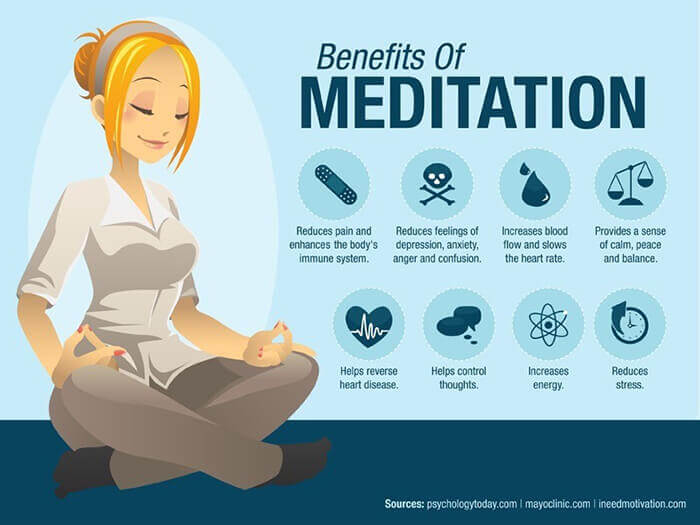The Benefits of Meditating
Meditation is a practice that has been around for centuries and has gained significant popularity in recent years. In this article, we will explore the numerous benefits of meditating and how it can positively impact your physical, mental, and emotional well-being.
Stress Reduction
Meditation is widely known for its ability to reduce stress levels. By engaging in regular meditation sessions, individuals can experience a sense of calmness and relaxation. This practice allows you to disconnect from the chaos of daily life and focus on the present moment, helping to alleviate anxiety and promote a peaceful state of mind.
Improved Mental Clarity
One of the key benefits of meditating is the enhancement of mental clarity. Through meditation, you can develop a greater awareness of your thoughts and emotions. This increased self-awareness can lead to improved decision-making skills and a clearer understanding of your goals and aspirations.
Enhanced Emotional Well-being
Meditation has been shown to have a positive impact on emotional well-being. Regular practice can help reduce symptoms of depression and anxiety, as well as increase feelings of happiness and contentment. By cultivating a sense of inner peace and mindfulness, individuals can better manage their emotions and experience a greater sense of overall well-being.
Improved Focus and Concentration
Another significant benefit of meditating is the improvement in focus and concentration. By training your mind to stay present and focused during meditation, you can carry this skill into your daily life. This increased ability to concentrate can enhance productivity, boost creativity, and improve your overall performance in various tasks and activities.
Enhanced Physical Health
While meditation is primarily a mental practice, it can also have a positive impact on your physical health. Studies have shown that regular meditation can help lower blood pressure, reduce the risk of heart disease, and improve sleep quality. Additionally, meditation can aid in pain management and strengthen the immune system.
Increased Self-Awareness
Meditation allows you to develop a deeper understanding of yourself. By taking the time to observe your thoughts, emotions, and physical sensations without judgment, you can gain valuable insights into your own behavior and patterns. This increased self-awareness can lead to personal growth, improved relationships, and a greater sense of self-acceptance.

In conclusion, the benefits of meditating are vast and can positively impact various aspects of your life. From stress reduction and improved mental clarity to enhanced emotional well-being and increased self-awareness, incorporating meditation into your daily routine can bring about profound positive changes. Start your meditation practice today and experience the transformative effects it can have on your overall well-being.
Frequently Asked Questions
1. What are the benefits of meditating?
Meditating has numerous benefits including reducing stress, improving focus and concentration, enhancing self-awareness, promoting emotional well-being, and increasing overall mental clarity.
2. How does meditation help in reducing stress?
Meditation helps in reducing stress by activating the relaxation response in the body, which counteracts the effects of stress hormones and induces a state of calmness and relaxation.
3. Can meditation improve my focus and concentration?
Yes, regular meditation practice can improve focus and concentration by training the mind to stay present and resist distractions. It enhances cognitive abilities and helps in maintaining attention for longer periods.
4. Does meditation have any impact on emotional well-being?
Absolutely! Meditation can have a significant impact on emotional well-being. It reduces symptoms of anxiety and depression, promotes positive emotions, and enhances overall emotional resilience.
5. Can meditation help in managing chronic pain?
Yes, meditation can be an effective tool for managing chronic pain. It helps in reducing the perception of pain by altering the brain’s response to pain signals and promoting a sense of relaxation and well-being.
6. How long do I need to meditate to experience benefits?
The duration of meditation varies for each individual. However, even as little as 10-15 minutes of daily meditation can start to yield noticeable benefits. Consistency is key, so it’s recommended to establish a regular practice.
7. Can meditation improve my sleep quality?
Yes, meditation can improve sleep quality by calming the mind, reducing stress and anxiety, and promoting relaxation. It can help in falling asleep faster and experiencing more restful sleep.
8. Are there any scientific studies supporting the benefits of meditation?
Yes, there is a growing body of scientific research that supports the benefits of meditation. Numerous studies have shown its positive effects on mental health, cognitive function, emotional well-being, and physical health.
9. Can meditation enhance creativity?
Yes, meditation can enhance creativity by quieting the mind and allowing new ideas to emerge. It helps in accessing deeper levels of consciousness and fosters a state of openness and receptivity to creative inspiration.
10. Is meditation suitable for everyone?
Generally, meditation is suitable for most individuals. However, it may not be recommended for those with certain mental health conditions. It’s always advisable to consult with a healthcare professional before starting a meditation practice.




